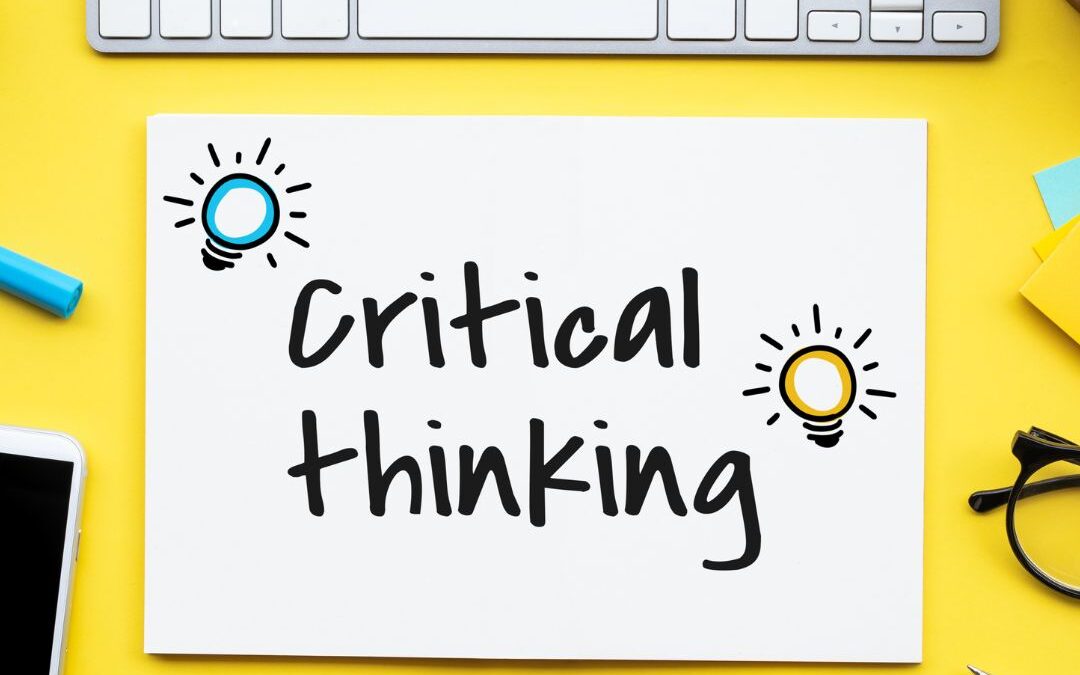
Critical Thinking
In a world where GPS leads our every move, Google provides instant answers to our questions, and AI processes vast amounts of data – we have to confront a question: what happens to our minds when we delegate analytical tasks to machines?
Critical thinking has been our lifeline throughout human history. Our ancestors had to be sharp thinkers to survive the wilds, making split-second decisions to outsmart predators or find food. Over time, those who were best at thinking on their feet passed on those genes. Through evolution, our brains have become wired to prioritize critical thinking; it’s in our DNA. Whether it’s resolving a difficult situation at work or making a big life decision, critical thinking is what helps us make better choices.
In modern society, critical thinking is a desired outcome of education, it facilitates better judgment, and it increases the chances we’ll come up with logical solutions. Research shows that critical thinking isn’t just a nice-to-have skill, it’s essential for making good decisions and solving problems.
“Education is not the learning of facts, but the training of the mind to think.” – Albert Einstein
Beyond Convenience
As modern conveniences become more prevalent in our daily lives, there’s been a gradual erosion of our critical thinking skills. With its ability to quickly perform complex mathematical calculations, the calculator revolutionized how we approach numerical problems. Yet, as reliance on calculators grew, so did concerns about their impact on cognitive development. While calculators make math easier, they also make us wonder if we’re losing our ability to do math in our heads and relying too much on external help instead of thinking things through ourselves.
Over the years, the switch from manual to automatic driving in cars has really changed how we think behind the wheel. Back in the day, driving a manual meant you were constantly engaged, juggling gear shifts and keeping an eye on the road. It was like a mental workout, keeping your brain sharp – and some drivers prefer stick shift transmissions to this day for this reason. Automatic transmission takes a lot of that cognitive load off our shoulders. It’s made driving more convenient, but it also means we might not need to flex those problem-solving muscles as much. As cars become smarter, more automated, and software-defined, we’ll continue to see an impact on the driver experience and concerns about the risks that could come with operating fully autonomous vehicles. We’re becoming more dependent on automated solutions and less inclined to engage in the cognitive processes that once defined our ability to explore and understand the world around us.
Suggested Video: 5 tips to improve your critical thinking
Mind the Gap
New innovative tools and technologies make our daily lives easier, but they may undermine our critical thinking skills in the long run. By consciously finding a balance between relying on technology and engaging our cognitive abilities, we can mitigate these risks.
Here are a few examples of how we can harness the benefits of technology while also preserving our capacity for independent thought, problem-solving, and analytical reasoning:
- GPS: GPS navigation devices and apps are changing the way we get around, telling us exactly where to go and how to get there. As convenient as it is, relying on GPS is affecting our critical thinking skills because the technology assumes the role of a mental compass. Instead of using our brains to figure out directions and navigate on our own, we’re letting the GPS do all the work. Research shows that outsourcing our navigation skills to technology impacts the hippocampus, the part of the brain associated with spatial memory, spatial navigation, and mental mapping. Greater GPS use is linked with a steeper decline in hippocampal-dependent spatial memory. Consider using your GPS as a reference while also paying attention to road signs and landmarks or use a paper map. Challenge yourself to mentally map out your route and embrace detours, which will make you more adaptable and improve problem-solving skills if you end up in an unfamiliar area.
- Search Engines: Search engines find answers to our questions with unprecedented speed, but this ease of access can lead to a passive consumption of information, where we accept search engine results at face value without critically evaluating their accuracy or reliability. Research suggests we tend to offload information onto the Internet and rely on external devices as a form of transactive memory. We also tend to prioritizeremembering where to find information over actually retaining the information, which can impact the depth of analytical thinking and the ability to critically evaluate the veracity and significance of the information. Stay sharp by critically assessing the credibility of sources you come across in search engine results. Look for trusted sources to ensure the information you find is accurate. Double-check by comparing information from multiple sources to get a fuller picture of the topic.
- Autocorrect: Autocorrect and spell check also have a sneaky way of influencing our critical thinking. By fixing our spelling mistakes, these tools can make us lazy about double-checking our own writing and they’re not always right. Research suggests students focus less on spelling because auto-correction will correct their mistakes for them. These examples of some autocorrect fails are enough motivation to be more mindful. Consider disabling autocorrect for important messages temporarily, relying on your own spelling and grammar skills without interference. Look up unfamiliar words or grammatical rules to understand why autocorrect made a particular correction, and adjust settings such as autocorrect sensitivity, or predictive text.
- Online Reviews: When we’re shopping, online reviews can sway our decisions, giving us the scoop on products and services. Sometimes, without realizing it, we can get caught up in this unprecedented amount of information and the overall vibe of reviews without thinking critically about each one. Whether glowing or grumbling, we tend to follow the crowd instead of digging deeper. We might not even consider who’s behind the reviews or their motives. Take reviews with a grain of salt and do your own bit of thinking, too. Consider the reputation and reliability of the website or platform, seek out reviews from multiple sources to get a more balanced perspective, and look for more detailed and informative testimonials that can help you make informed decisions.
Suggested Video: Encourage critical thinking with 3 questions
“It is the mark of an educated mind to be able to entertain a thought without accepting it.” – Aristotle
Mind Over Machine
So, how do we stay afloat in this tech-soaked world? Technology is everywhere, but it’s important to nurture our soft skills like empathy and emotional intelligence. Embrace lifelong learning, stay open to picking up new skills, and be mindful of technology’s impact on our daily lives. We can strike a balance between convenience and preserving our critical thinking skills, ensuring that we are in the driver’s seat.
Written by: Rosie Del Campo
Additional Sources
Clark, Natural-Born Cyborgs: Minds, Technologies, and the Future of Human Intelligence (Oxford Univ. Press, New York, 2003).



